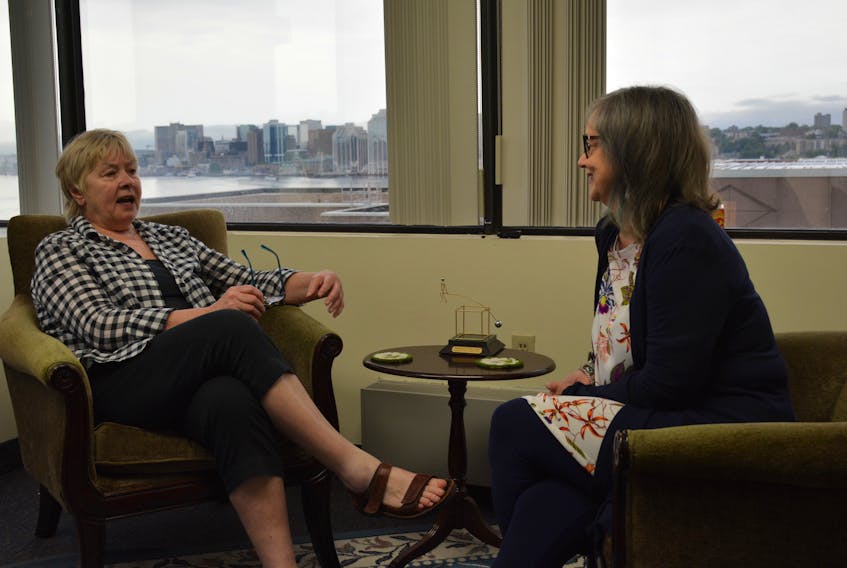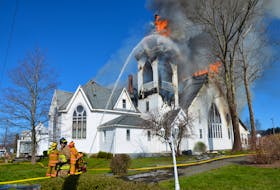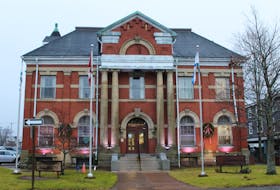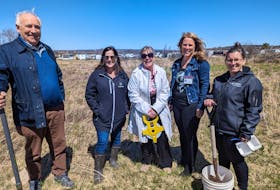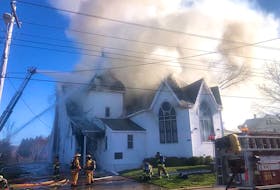Editor’s Note — This story may be difficult to read for people who have lived through, or are currently in, an abusive situation.
DARTMOUTH, N.S. - Wendy Keen has a million-dollar view of the Halifax Harbour, but she’s working with a shoestring budget.
“We look very important here on the ninth floor of an office building, but we’re a charity case when it comes to running things,” Keen said, coffee mug in hand. “There’s not much left at the end of the day.”
Keen is the executive director of New Start, in Dartmouth, which helps men who use abuse or have used abuse against their partners, whether physically, emotionally or verbally.
Keen gave up working two of her five days a week in order to pay salaries for more therapists. She sees this work as vital to stopping abuse at the source.
She’s been with New Start since 2009, following a long career in the department of community services. Before that, she worked for Bryony House, a shelter for women and children leaving violence.
“When I was at Bryony House, people were asking, ‘well, who’s working with the men?’” Keen said.
It’s a question she’s hoping New Start, and organizations like it, can answer.
New Start began as a small, weekly counselling program at Veith House called Project New Start, run by a social worker. It has since expanded into its own non-profit organization and society.
It’s part of a network of Men’s Intervention Programs (MPIs) spread out over the province. The MPIs include Family Service Association of Western Nova Scotia in Bridgewater, New Direction in Amherst, New Leaf in New Glasgow, Bridges Institute in Truro and New Start in Dartmouth.
Funding
The majority of New Start’s funding comes from the provincial department of community services. But, Keen said, the group is struggling with growing demand and limited resources.
“We’re funded on a model that’s a little bit out of date and doesn’t fit the actual quality and quantity of work that we’re doing now,” she said.
A recent injection of funding is now coming in from the provincial justice department after the formation of a domestic violence court, which looks exclusively at that type of case.
The domestic violence court opened in Halifax in March 2018, and New Start has seen its number of clients expand through that initiative.
Nova Scotia operates two domestic violence courts in the province — one in Sydney and one in Halifax.
The Department of Justice is providing $220,000 in 2018-2019 to Cornerstone in Sydney related to this work. In Halifax, New Start, in partnership with the People’s Counselling Clinic and other providers, are participating in the assessment and intake process and providing individual and group session counselling. The department is providing $170,000 to New Start and partners in 2018-2019 towards this work.
“We’ve been very involved with that roll out, especially when it comes to treatment plans,” she said. “Also, being able to demonstrate that the work we do here is valuable. People who have used abuse and violence begin to heal the harms that they have created.”
New Start pulls in approximately $20,000 a year in fees from clients, either directly or through healthcare insurance.
Keen said it’s part of a more restorative approach, rather than a strictly punitive one.
“Our focus is on helping them heal. They don’t have to get back together, but manage that harm that’s being created,” she said. “Some of the men we’ve helped have said, ‘if I had known there was New Start when I was a teenager, the first time I beat up my girlfriend, I wouldn’t be where I am now.’”

Counselling abuse
Jane Donovan, a registered counselling therapist at New Start, has been with the organization for 10 years. She's seen hundreds of clients – the abusers and the abused.
“Some men come in quite concerned that they’re using abuse and have done what they can to heal their relationship, but want to do more to ensure they’re on the right path,” she said. “Some men come in and are on the other end of the spectrum, kind of confused about what’s going on. And then everywhere in between.”
Donovan said the first step is usually acknowledging there is a problem, saying many abusers are often in denial about what took place.
“From what I’ve seen, all men know it’s not right to hit your partner,” she said. “The reason they’re in denial is because they’ve transgressed an important value.”
The fact that these clients feel shame and want to change is a good sign for Donovan. Remorse shows they understand what they did was wrong.
“My experience has been that the less I push them or accuse them and just listen to them, and they hear themselves speak, and they hear the untruth of what they’re saying, they start to say things like, ‘I’m not really an angel,’” she said.
“They tend to start hearing themselves. Many men tell me they don’t have someone they can talk to and given the opportunity, they start to be more honest with themselves.”
The change in behaviour usually doesn’t happen right away. Donovan said even the most eager clients usually need at least seven or eight sessions before they can be considered ready to move on.
“Some guys get it so quickly, and some people really struggle,” she said. “They may have other things going on in their lives. Poverty, unemployment, racism.
She said toxic masculinity can also get in the way of making positive changes.
“Men often say ‘I just lost it, I was out of control, couldn’t do anything about it,’ and sometimes that does happen, we lose control,” she said. “When we get triggered, the amygdala in our brain, which controls our emotions, gets cut off from our frontal lobe, which allows us to make decisions. If we get in such a state where we’ve been cut off from our frontal lobe, we have quite literally lost control.”
That’s when fight or flight kicks in, a relic from hunter/gatherer days. The key is to interrupt that or prevent that from happening.
“We blush when we’re embarrassed, we have a physical response to emotions, and if we start to get in tune with that, it can be very helpful,” she said. “It’s important to learn that every time your stomach gets tingly, it’s not always anxiety, you might be excited. It’s not always anger when your heart’s pumping rapidly, it can be love.”
But not everyone can be helped.
“If people come in, really determined not to make a change, there isn’t really a whole lot I can do with that,” she said.

#MeToo impact
Tod Augusta-Scott is the executive director of the Bridges Institute in Truro. He’s been there for 20 years now and has seen a culture shift in how men’s abuse is perceived.
“The work that’s being done in Nova Scotia is getting national and international attention,” Augusta-Scott said.
Some of that attention is thanks to A Better Man, a documentary that has screened at numerous film festivals and premiered at the Hot Docs Canadian International Documentary Festival.
The film follows two people, Attiya Khan and her former partner, just called Steve in the film, as they go through abuse counselling years after the incidents took place to come to terms with what happened and try to heal.
Khan explains how she feared for her life, how she didn’t understand why he wouldn’t stop if he felt sorry about it afterwards.
Augusta-Scott is one of the counsellors that helps them through the process. Hearing ‘Steve’ take responsibility for his past actions was crucial to healing.
“What we’re doing is really giving women who’ve been abused, harassed or been through domestic violence an opportunity to have the harms repaired by the person who did the harm in the first place,” he said. “It’s about creating more options for women.”
It’s often the women that will initiate the counselling, he said. They want it to end or heal from historic harms.
“It’s a misnomer to call it a Men’s Intervention Program,” he said. “The centre of the work that we do is with the women and working with the men to make them understand that they’re responsible.”
Augusta-Scott said the interest in the work he does at Bridges has skyrocketed as the Me Too movement continued to make waves internationally and here at home.
“In some ways, these programs are an answer to the Me Too movement. Guys were trying to apologize after these events and it was clear they had no idea how to do that,” Augusta-Scott said. “Our work really could help those men support the women they’ve hurt.”
Augusta-Scott has had people from as far as the United States reach out asking for help.
Men are stepping up. One of Augusta-Scott’s clients, who can’t be identified due to privacy reasons, came forward after harming his partner over 30 years ago. Now the partner wants to deal with it too.
Augusta-Scott said many of the victims aren’t sure if healing is possible, if the men can actually change.
“It doesn’t happen in all cases, but when it is possible, we want to support it,” he said. “Some guys are high risk and can’t change, so we won’t do it in those contexts. But in most cases men can change. The high-risk examples that get on television are the minority of the work.”
Despite the increase in interest from clients, Augusta-Scott said there’s no question that more resources are needed.
He’s hopeful that things will continue to improve, especially as Me Too and other movements continue to keep the issue in the spotlight.
“Over the past 20 years, we were very cynical about men changing. We never dreamed that the men would not only stop abuse, but also look at the effects of what they’ve done. I’ve had conversations today that I never thought possible back then,” he said.
“I’m inspired by the men and women that I work with. I can see that healing is possible after violence.”
READ MORE:
• Mental health movement says province’s system needs a change
• Pay equity, diversity critical to improving workplace climate: labour lawyer
• After #MeToo men wary about mentoring women in the workplace
Provincial priority
Andrew Preeper, a media spokesperson from the Department of Community Services, said the province takes domestic violence and abuse seriously.
“Domestic violence and abuse can happen to anyone. No one should live in fear,” Preeper said in a statement. “We are committed to disrupting the cycle of violence, and to support the prevention of domestic violence and all forms of gender-based violence in our communities.”
Currently the provincial government funds transition houses, women’s centres, housing, and organizations that provide men’s intervention programs, like New Start and Bridges Institute.
The Department of Community Services provides $836,574 in annual funding to the five MIPs across the province.
Preeper said the department is also increasing its focus on child welfare prevention and early intervention strategies and supports. This will include looking at our current programs and services, such as men’s intervention programs, to identify gaps and programming needs.

